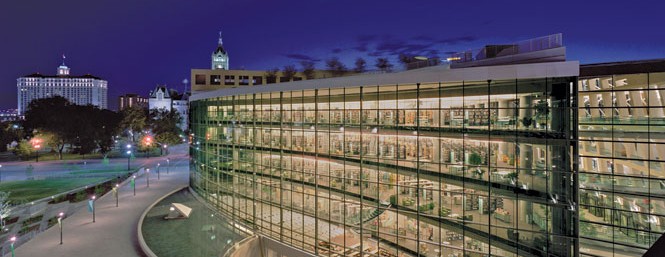All Nighter
Salt Lake City Main Library hopes proposed 24-hour service will benefit more than just the homeless
By Eric S. Peterson @ericspetersonFor years, Salt Lake City leaders have dreamed of the capital city buzzing with activity 24 hours a day, and for years the city's night owls have been able to enjoy late-night attractions—questionable steak-and-egg specials at all-night diners and shopping at a handful of 24-hour grocery stores.
Now, the Salt Lake City Main Library at 210 E. 400 South is moving closer to enacting a bold pilot program to expand library service 24 hours a day, beyond the library's typical 9 a.m. to 9 p.m. weekday hours and its shorter weekend schedule. A plan is progressing for a two-year pilot that would be funded entirely through private donations—at a cost anticipated to be $600,000 a year—to create the first 24-hour library in the nation. While the big price tag comes with plans for all-night programming and community events, the idea has also drawn skepticism from those worried the proposal would transform the popular day hang-out for the city's homeless into a new type of homeless shelter, complete with plenty of bedtime reading.
A 24-hour library was originally seen as a potential resource for homeless youth, especially LGBT teens who often find themselves in dire straits after being kicked out of abusive homes or leaving over differences with family about their sexual orientation or gender identity. For all youth, the adult shelters often seem intimidating and dangerous, given the criminal element there that preys on the vulnerable.
Jason Mathis, the director of the Downtown Alliance, says that 24-hour library concept came about through a unique collaboration between Bruce Bastian, entrepreneur, philanthropist and supporter of LGBT causes, and Bill Evans, a former spokesman for The Church of Jesus Christ of Latter-day Saints.
Bill Tibbitts, a homeless-issues advocate with the Crossroads Urban Center, applauds the proposed expansion of library hours, noting the way the homeless currently get along with day patrons and saying, "At a minimum, this would give homeless people in the downtown area a safe, legal and sanitary place to go to the bathroom at night," Tibbitts says.
When Alliance head Mathis brought the idea to library director John Spears, he says Spears was very receptive to the idea on the condition that the library be open to all residents—be they homeless youth, graveyard-shift workers, test-cramming college students or just your run-of-the-mill insomniacs.
"There's legitimate benefits to having a public space open 24 hours a day and bringing people together where you have a sense of community that's not a 7-Eleven or Denny's," Mathis says.
Mathis says the pilot could be implemented efficiently and economically. For example, instead of hiring more staff and security personnel, only two of the library's levels would be left open all night. Mathis points out that the facility already runs heating, air conditioning and some of its lighting 24 hours a day. But he also admits the idea isn't a "slam dunk" yet, and that the library was wise not to move too fast with the idea.
Instead, the library has recently gathered around 3,000 public comments and is in the process of conducting a security audit that will evaluate security policies as well as how best to work with the Salt Lake City Police Department to ensure safety at Library Square.
Spears says that the library board will weigh these factors when it votes on whether or not to implement the pilot program, likely by early summer. Already, though, he sees a lot of potential benefits. He can imagine nighttime computer and GED classes, more outreach for homeless patrons (who would still have to abide by library rules that prohibit sleeping or causing disturbances in the facility), movie marathons and stargazing activities. He likes the idea of giving space to organizations like the Utah Arts Festival to host 24-hour dances and performances. If he had his druthers, he'd like to see yoga classes held at sunrise. But, most importantly, he says the community at large could define the city's nightlife.
"I think it says so much about this city that our foray into becoming a New York or a Paris—someplace that has a vibrant urban core that functions 24 hours a day—is to say, 'What if it was the public library?' Spears says. "That's a great testament to this city."
More by Eric S. Peterson
-
The Secret Sauce
How Utah lawmakers disclose—or don't disclose—conflicts of interest.
- Feb 14, 2024
-
Police departments in Salt Lake County spent almost $20 million on civil rights complaints in the past decade
The Co$t of Mi$conduct
- Oct 18, 2023
-
Women decry harassment and toxic culture at St. George auto dealership
Men at Work
- Oct 11, 2023
- More »
Latest in News
Readers also liked…
-
Raise a glass for E.L.T Harrison, architect of the Beerhive building on Main
Small Lake City
- Oct 11, 2023





